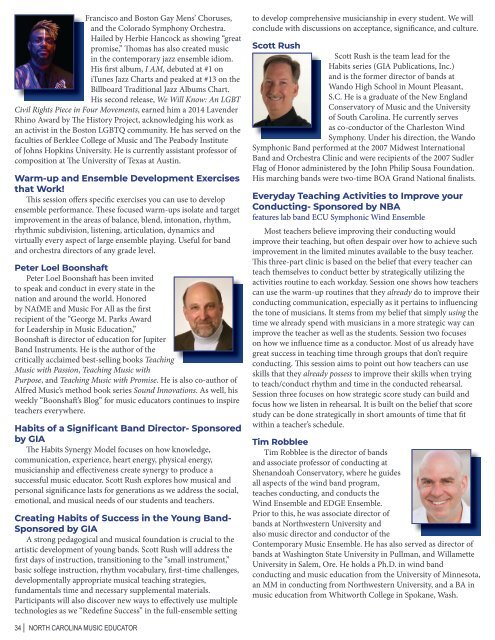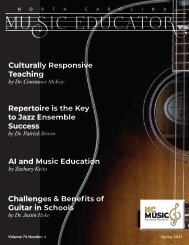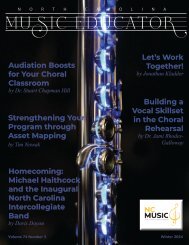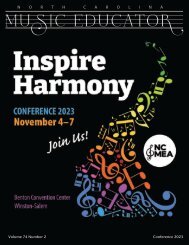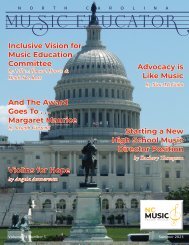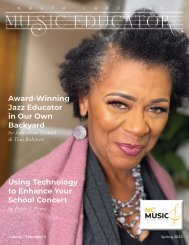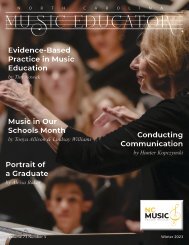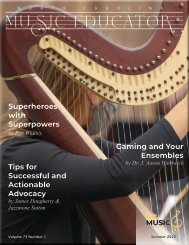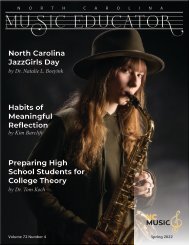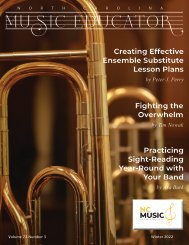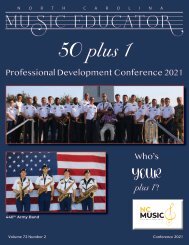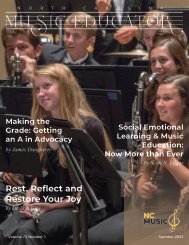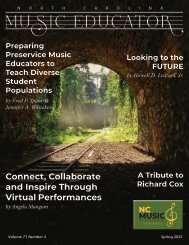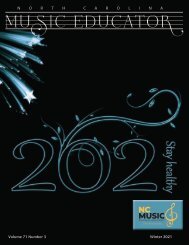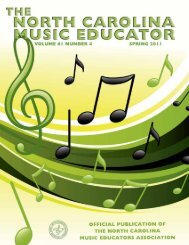NC Music Educator Conference Edition 2022
North Carolina Music Educators Association professional journal Conference edition 2022
North Carolina Music Educators Association professional journal Conference edition 2022
You also want an ePaper? Increase the reach of your titles
YUMPU automatically turns print PDFs into web optimized ePapers that Google loves.
Francisco and Boston Gay Mens’ Choruses,<br />
and the Colorado Symphony Orchestra.<br />
Hailed by Herbie Hancock as showing “great<br />
promise,” Thomas has also created music<br />
in the contemporary jazz ensemble idiom.<br />
His first album, I AM, debuted at #1 on<br />
iTunes Jazz Charts and peaked at #13 on the<br />
Billboard Traditional Jazz Albums Chart.<br />
His second release, We Will Know: An LGBT<br />
Civil Rights Piece in Four Movements, earned him a 2014 Lavender<br />
Rhino Award by The History Project, acknowledging his work as<br />
an activist in the Boston LGBTQ community. He has served on the<br />
faculties of Berklee College of <strong>Music</strong> and The Peabody Institute<br />
of Johns Hopkins University. He is currently assistant professor of<br />
composition at The University of Texas at Austin.<br />
Warm-up and Ensemble Development Exercises<br />
that Work!<br />
This session offers specific exercises you can use to develop<br />
ensemble performance. These focused warm-ups isolate and target<br />
improvement in the areas of balance, blend, intonation, rhythm,<br />
rhythmic subdivision, listening, articulation, dynamics and<br />
virtually every aspect of large ensemble playing. Useful for band<br />
and orchestra directors of any grade level.<br />
Peter Loel Boonshaft<br />
Peter Loel Boonshaft has been invited<br />
to speak and conduct in every state in the<br />
nation and around the world. Honored<br />
by NAfME and <strong>Music</strong> For All as the first<br />
recipient of the “George M. Parks Award<br />
for Leadership in <strong>Music</strong> Education,”<br />
Boonshaft is director of education for Jupiter<br />
Band Instruments. He is the author of the<br />
critically acclaimed best-selling books Teaching<br />
<strong>Music</strong> with Passion, Teaching <strong>Music</strong> with<br />
Purpose, and Teaching <strong>Music</strong> with Promise. He is also co-author of<br />
Alfred <strong>Music</strong>’s method book series Sound Innovations. As well, his<br />
weekly “Boonshaft’s Blog” for music educators continues to inspire<br />
teachers everywhere.<br />
Habits of a Significant Band Director- Sponsored<br />
by GIA<br />
The Habits Synergy Model focuses on how knowledge,<br />
communication, experience, heart energy, physical energy,<br />
musicianship and effectiveness create synergy to produce a<br />
successful music educator. Scott Rush explores how musical and<br />
personal significance lasts for generations as we address the social,<br />
emotional, and musical needs of our students and teachers.<br />
Creating Habits of Success in the Young Band-<br />
Sponsored by GIA<br />
A strong pedagogical and musical foundation is crucial to the<br />
artistic development of young bands. Scott Rush will address the<br />
first days of instruction, transitioning to the “small instrument,”<br />
basic solfege instruction, rhythm vocabulary, first-time challenges,<br />
developmentally appropriate musical teaching strategies,<br />
fundamentals time and necessary supplemental materials.<br />
Participants will also discover new ways to effectively use multiple<br />
technologies as we “Redefine Success” in the full-ensemble setting<br />
to develop comprehensive musicianship in every student. We will<br />
conclude with discussions on acceptance, significance, and culture.<br />
Scott Rush<br />
Scott Rush is the team lead for the<br />
Habits series (GIA Publications, Inc.)<br />
and is the former director of bands at<br />
Wando High School in Mount Pleasant,<br />
S.C. He is a graduate of the New England<br />
Conservatory of <strong>Music</strong> and the University<br />
of South Carolina. He currently serves<br />
as co-conductor of the Charleston Wind<br />
Symphony. Under his direction, the Wando<br />
Symphonic Band performed at the 2007 Midwest International<br />
Band and Orchestra Clinic and were recipients of the 2007 Sudler<br />
Flag of Honor administered by the John Philip Sousa Foundation.<br />
His marching bands were two-time BOA Grand National finalists.<br />
Everyday Teaching Activities to Improve your<br />
Conducting- Sponsored by NBA<br />
features lab band ECU Symphonic Wind Ensemble<br />
Most teachers believe improving their conducting would<br />
improve their teaching, but often despair over how to achieve such<br />
improvement in the limited minutes available to the busy teacher.<br />
This three-part clinic is based on the belief that every teacher can<br />
teach themselves to conduct better by strategically utilizing the<br />
activities routine to each workday. Session one shows how teachers<br />
can use the warm-up routines that they already do to improve their<br />
conducting communication, especially as it pertains to influencing<br />
the tone of musicians. It stems from my belief that simply using the<br />
time we already spend with musicians in a more strategic way can<br />
improve the teacher as well as the students. Session two focuses<br />
on how we influence time as a conductor. Most of us already have<br />
great success in teaching time through groups that don’t require<br />
conducting. This session aims to point out how teachers can use<br />
skills that they already possess to improve their skills when trying<br />
to teach/conduct rhythm and time in the conducted rehearsal.<br />
Session three focuses on how strategic score study can build and<br />
focus how we listen in rehearsal. It is built on the belief that score<br />
study can be done strategically in short amounts of time that fit<br />
within a teacher’s schedule.<br />
Tim Robblee<br />
Tim Robblee is the director of bands<br />
and associate professor of conducting at<br />
Shenandoah Conservatory, where he guides<br />
all aspects of the wind band program,<br />
teaches conducting, and conducts the<br />
Wind Ensemble and EDGE Ensemble.<br />
Prior to this, he was associate director of<br />
bands at Northwestern University and<br />
also music director and conductor of the<br />
Contemporary <strong>Music</strong> Ensemble. He has also served as director of<br />
bands at Washington State University in Pullman, and Willamette<br />
University in Salem, Ore. He holds a Ph.D. in wind band<br />
conducting and music education from the University of Minnesota,<br />
an MM in conducting from Northwestern University, and a BA in<br />
music education from Whitworth College in Spokane, Wash.<br />
Developing Ensemble Skills through Ensemble<br />
Games<br />
features lab band Hickory Ridge High School Wind Ensemble<br />
This practical rehearsal clinic will focus on fostering artistic<br />
curiosity through ensemble “games.” We will explore ways to<br />
develop ensemble skills throughout the rehearsal that not only<br />
encourage deeper student engagement, but also maximize<br />
inspirational opportunities. Games will focus on music<br />
fundamentals such as listening, pulse, articulations, and intonation.<br />
The clinic will be divided into three parts. The first part will<br />
demonstrate ways to incorporate games into the warm-up routine,<br />
and focus on ensemble pulse, intonation, and articulations. The<br />
second part will explore practical ways to engage students in<br />
the rehearsal process using games that focus more on listening<br />
and alignment. The third part will discuss how to implement<br />
these games into the overall curriculum. By the end of the clinic,<br />
attendees will have new tools to add to their rehearsal toolkit they<br />
can immediately incorporate into their rehearsals that will engage<br />
their students in a different and deeper way.<br />
Dr. Margaret Underwood<br />
Dr. Margaret Underwood is director of<br />
bands and associate professor of music at<br />
Western Carolina University where she<br />
conducts the Wind Ensemble, guides all<br />
aspects of the wind bands, and teaches<br />
courses in music education. In addition<br />
to her presentations at numerous state<br />
conferences, she has also presented her<br />
research at the College Band Directors<br />
National Association regional and<br />
national conferences, the World Association of Symphonic Bands<br />
and Ensembles International <strong>Conference</strong>, the US Navy Band<br />
International Saxophone Symposium, and the International Society<br />
for Research and Promotion of Wind <strong>Music</strong>. Her research on<br />
Robert Kurka’s The Good Soldier Schweik Suite is published in The<br />
Journal of World Association of Band and Symphonic Ensembles.<br />
Diversifying Your Concert Program – Band New<br />
<strong>Music</strong> Reading Session<br />
Representation matters! It is imperative our students see<br />
themselves represented in the music we study and perform in<br />
our classrooms. This session will explore up to twenty new and<br />
diverse works for concert band (Grades 1 – 5) which are written<br />
by underrepresented composers, including those who identify as<br />
women, BIPOC, and LGBTQIA+. Our intent is to expose band<br />
directors to quality new works by wind band composers who are<br />
not regularly programmed in efforts to help educators diversify<br />
their concert programs. This session will introduce attendees<br />
to several wonderful pieces and composers, and also provide<br />
resources for further research on diverse and talented composers<br />
who are writing music today. All attendees are welcome to sit and<br />
play in the ensemble. Bring your band instrument and come learn<br />
about some amazing new works for concert band!<br />
Carolina Perez<br />
Carolina Perez is an instructor of music at the North Carolina<br />
School of Science and Mathematics, where she teaches Wind<br />
Ensemble, Jazz Ensemble, and music theory.<br />
Carolina Perez, Brian Myers and Page Newsome<br />
Brian Myers<br />
Brian Myers is the current president of the East Central District<br />
Bandmasters Association. He has served as the director of bands at<br />
Green Level High School since the school opened in 2019.<br />
Page Newsome<br />
Page Newsome has served as director of bands at Middle Creek<br />
High School since 2020, and earned the <strong>NC</strong>ECDBA Band Director<br />
of the Year Award in 2021<br />
<strong>Music</strong>al Nourishment: Designing Your Daily<br />
Instructional Menu<br />
Middle School Band is where students begin the foundational<br />
development that supports their musical journey. This session<br />
will focus on the ways we organize our instructional time –<br />
are we stuck in a rigid and linear approach or do we foster an<br />
environment that encourages flexibility with a three-dimensional<br />
array of choices? Attendees will have the opportunity to re-imagine<br />
ways to allow for creativity within the structure of each class for<br />
optimal musical nourishment.<br />
Dominic Talanca, Kathy Johnson and Asa Burk<br />
Dominic Talanca<br />
Dominic Talanca is director of bands and associate professor of<br />
music at U<strong>NC</strong> Wilmington.<br />
Kathy Johnson<br />
Kathy Johnson, adjunct professor of woodwind and brass<br />
techniques at the University of North Texas, has led a distinguished<br />
career of 40 years teaching music education in Texas.<br />
Asa Burk<br />
Asa Burk is recently retired from a 30-year career where he<br />
taught in middle and high schools in the Dallas-Fort Worth area.<br />
Culture Building: Redefining Success through<br />
Excellence and Community<br />
Among the many losses we have endured as a result of<br />
COVID-19 is the loss of community and the erosion of the culture<br />
of our program. Students and directors have felt this loss deeply.<br />
As we continue emerging from the pandemic, it is time to focus on<br />
34 | NORTH CAROLINA MUSIC EDUCATOR NORTH CAROLINA MUSIC EDUCATOR | 35


